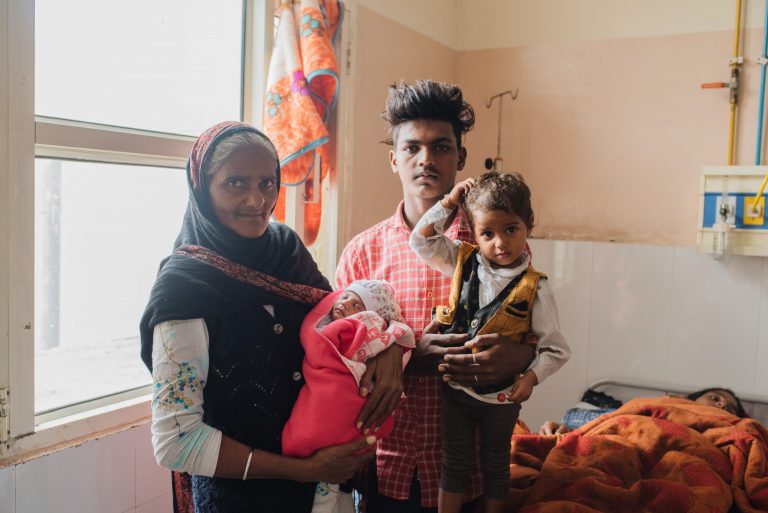In the initial days of the lockdown in India, Noora Health spoke with recently delivered mothers to understand their experiences. Challenges that mothers reported centered around what they should do if they or their baby got sick:
- “If my baby has any health issues, how will I go to the clinic?”
- “We have to give vaccination to the baby, but I wanted to know is it safe to go to the hospital for vaccination?”
- “We are very concerned about this because whoever comes from outside touches the baby and we have no idea whether the person is infected or not. Also, we don’t know where is that person coming from”
It is critical to make every touchpoint that a mother and her family has with the health system count. This has never been so true as during a pandemic, where antenatal care visits have decreased, postnatal check-ups and vaccination appointments have been missed,1 community health workers (usually focused on MNH care) have been reassigned to outbreak-related duties,2 and restricted transportation and access have created major barriers.3 The childbirth event, specifically after a child is born but before leaving the facility, becomes a key opportunity to educate and empower mothers and their family members to practice preventative behaviors at home, recognize danger signs, and know when to take action. 4
A new model of postpartum education, engaging new mothers and their families, has been underway since 2017 led by Noora Health, in collaboration with four Indian state governments (Karnataka, Punjab, Maharashtra, and Madhya Pradesh). The program uses a family-centered design to create impactful curricula and trains existing facility staff to deliver simple, interactive demonstrations, and use multimedia to turn the hours spent by patients and their families in the wards and in crowded hospital hallways into learning opportunities. After discharge from the hospital, patients can opt to participate in a WhatsApp service to reinforce key health behavior change messages and to answer questions raised by families, complementing the existing follow-up services by ASHAs. The core curriculum focuses on key practices, such as: exclusive breastfeeding, dry cord care, skin-to-skin care, handwashing, healthy unrestricted maternal diet, and recognition of danger signs.
Noora Health, in partnership with Ariadne Labs, have designed and implemented a multi-site research study to understand the behavior change outcomes from this patient education program. The Covid-19 pandemic and subsequent shut-down across India struck in the midst of our research-focused data collection, which for ethical reasons was paused, although a modified program continues to be run by facility staff. Our interim findings, collected from eight early-adopter facilities from September 2018 to December 2019 (before the start of the pandemic), offer insights that may be immediately useful to implementers.
In phone calls to over 7900 mothers one month after delivery, we compared knowledge and self-reported behaviors in mothers who received the training versus those who did not. We found that the trained and untrained groups were similar in age, parity, and education level. However, women who had a cesarean section delivery or had a baby in the Sick Newborn Care Unit (SNCU) were more likely to attend the training, which could either be attributed to patients’ increased interest in learning health information after a serious health event, or a longer stay at the facility (increased opportunity to attend an education session) or a combination of both.
We found that 72% of moms who received the training reported that they did the recommended dry cord care, compared with 52% of untrained moms. Knowledge and self-reported practice of skin-to-skin care was higher in the trained group (29% vs. 7%), but still remained low overall, indicating an area of improvement. Exclusive breastfeeding knowledge and practice was relatively high (over 87%) in both groups. Newborn readmissions were lower for the trained group (1.3%) versus the untrained group (2.8%), which is notable since those in the trained group included more babies that were sick enough to have stayed in the SNCU.
In the midst of the Covid-19 pandemic, maternal and neonatal healthcare services have been disrupted. Now more than ever, it is important to make interactions with the healthcare system efficient and high quality, to educate families on how to prevent complications and when to seek care.
Call to action:
- In-facility childbirth is a key opportunity to influence the well-being of the mother and baby, especially during the covid-19 pandemic when there is a disruption in antenatal and postpartum care.
- Major health events can increase a patient’s interest in adopting new behaviors. Patients that had complications were more likely to participate in education. In the midst of the Covid-19 pandemic, it is important to offer training opportunities during a mother’s stay at a facility to optimize post-discharge health outcomes, when follow up may be inconsistent.
- Knowledge about exclusive breastfeeding is strong, and can provide a foundation for offering other health messages, such as dry cord care and skin-to-skin care.
- Patient education alone is unlikely to impact maternal or neonatal mortality, but is a key aspect of prevention and early recognition of complications.
- WhatsApp engagement and other innovative ways to interact remotely with mothers post-discharge may help to fill the gaps in follow-up created by the pandemic.
- Additional information on how we are working to keep communities safe during the pandemic are available through the Noora health website.
1 Cash R, Patel V. Has COVID-19 subverted global health? Lancet 2020; 395: 1687–8.
2 Ministry of Health and Family Welfare, India. Micro Plan for Containing Local Transmission of Coronavirus Disease (COVID-19). Ministry of Health and Family Welfare, 2020 https://www.mohfw.gov.in/pdf/ModelMicroplanforcontainmentoflocaltransmissionofCOVID19.pdf (accessed July 31, 2020).
3 Dore B. Covid-19: collateral damage of lockdown in India. BMJ 2020; 369: m1711.
4 Subramanian L, Murthy S, Bogam P, et al. Just-in-time postnatal education programmes to improve newborn care practices: needs and opportunities in low-resource settings. BMJ Glob Health 2020; 5. DOI:10.1136/bmjgh-2020-002660.
